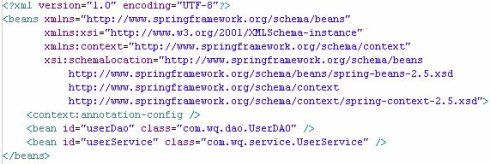Spring中使用annotation注入
我们使用Spring 一般式在xml配置文件中进行注入.但是这种方式使得配置过于臃肿。试想一个应用中,有上千个对象,而每个对象又需要注入很多其它对象,那么我们的配置文件就显得非常的臃肿了。
Spring2.0 以后,我们可以使用annotation来为Spring的配置文件进行“减肥”
我使用的是Spring2.5.
第一:首先准备需要的jar包:SPRING_FRAMEWORK_HOME 为 spring 发行包所在的目录
A) SPRING_FRAMEWORK_HOME/dist/spring.jar
B) SPRING_FRAMEWORK_HOME/lib/ jakarta-commons/ commons-logging.jar
C) SPRING_FRAMEWORK_HOME/lib/log4j / log4j- 1.2.15.jar(为了在项目中使用log4j输出日志信息)
D) SPRING_FRAMEWORK_HOME/lib/j2ee/common-annotations.jar
第二:引入Spring配置的命名空间以及命名空间的schema文件的配置.这些配置可以到参考手册中找到。参考手册在SPRING_FRAMEWORK_HOME/ docs/reference中。有html版本和pdf版本。找到【3.2.1.1. Configuration metadata】 拷贝配置即可
<? xml version = "1.0" encoding = "UTF-8" ?>
< beans xmlns = "http://www.springframework.org/schema/beans"
xmlns:xsi = "http://www.w3.org/2001/XMLSchema-instance"
xmlns:context = "http://www.springframework.org/schema/context"
xsi:schemaLocation = "http://www.springframework.org/schema/beans
http://www.springframework.org/schema/beans/spring-beans-2.5.xsd
http://www.springframework.org/schema/context
http://www.springframework.org/schema/context/spring-context-2.5.xsd " >
< context:annotation-config />
</ beans >
在java代码中使用@Autowired或者@Resource注解方式进行装配。但我们要在xml配置中引入以下信息:
A) context 命名空间以及这个命名空间的 schema 文件
B) <context:annotation-config /> 让 Spring 启用对 annotation 的支持。它其实是注册 了多个对 annotation 进行解析处理的处理器 :
AutowiredAnnotionBeanPostProcessor
CommonAnnotationBeanPostProcessor
PersistenceAnnotionBeanPostProcessor
RequiredAnnotationBeanPostProcessor.
( 注意 :annotation 本身是不能干活的,要想让 annotation 干活,必须要有处理器来解析 annotion)
第三:在java代码中使用@Resource进行注入
public class UserService {
@Resource(name="userDao")
private UserDAO userDao;
public UserDAO getUserDao() {
return userDao;
}
public void setUserDao(UserDAO userDao) {
this.userDao = userDao;
}
public String[] getAllUser(){
return userDao.findUsers();
}
}
第四:配置文件中的配置:
可以看到,我们没有在配置文件中为userService注入userDao,因为在 UserService类中使用annotation的方式注入
